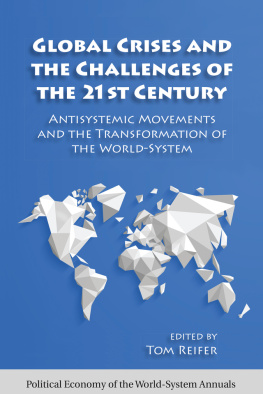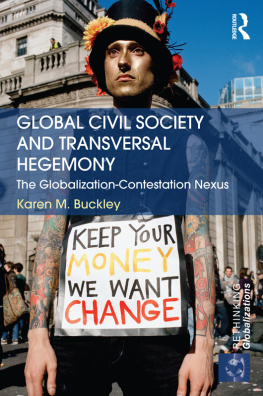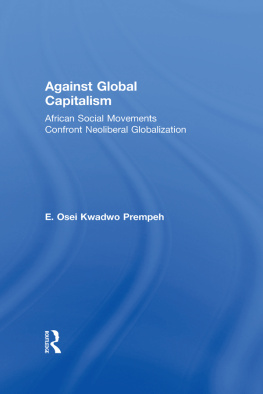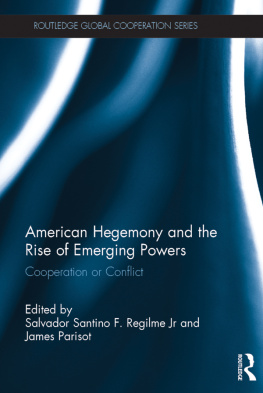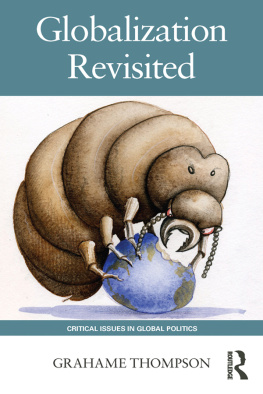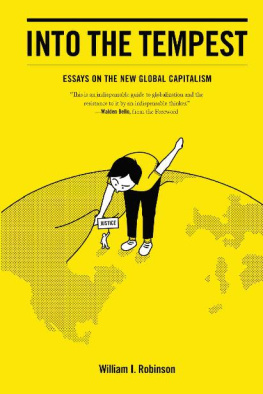GLOBALIZATION, HEGEMONY & POWER
Antisystemic Movements & the Global System
edited by
Thomas Ehrlich Reifer
Political Economy of the World-System Annuals, Volume XXVI-a
Immanuel Wallerstein, Series Editor
First published 2004 by Paradigm Publishers
Published 2016 by Routledge
2 Park Square, Milton Park, Abingdon, Oxon OX14 4RN
711 Third Avenue, New York, NY 10017, USA
Routledge is an imprint of the Taylor & Francis Group, an informa business
Copyright 2004, Taylor & Francis.
All rights reserved. No part of this book may be reprinted or reproduced or utilised in any form or by any electronic, mechanical, or other means, now known or hereafter invented, including photocopying and recording, or in any information storage or retrieval system, without permission in writing from the publishers.
Notice:
Product or corporate names may be trademarks or registered trademarks, and are used only for identification and explanation without intent to infringe.
Application has been made for Library of Congress Cataloging-in-Publication Data.
Designed and Typeset by Straight Creek Bookmakers.
ISBN 13: 978-1-59451-026-7 (hbk)
ISBN 13: 978-1-59451-027-4 (pbk)
CONTENTS
Thomas Ehrlich Reifer
Immanuel Wallerstein
Joachim Karl Rennstich
William I. Robinson
Jeffrey Kentor
Amy Holmes
Kathleen C. Schwartzman
Edna Bonacich
Terry Boswell
Paul M. Lubeck and Thomas Ehrlich Reifer
Lauren Langman
With one exception, all of the chapters in this book were originally presented at the Political Economy of World-Systems Conference, held at the University of California, Riverside (UCR), May 34, 2002, and hosted by the Institute for Research on World-Systems (IROWS). Especially deserving of thanks are Acting UCR Chancellor David Warren, Acting Executive Vice Chancellor Satish Tripathi, and Dean Patricia OBrian of the College of Humanities, Arts, and Social Sciences, who provided generous support. Additionally, the work of co-organizers Eugene Anderson (UCR Anthropology), Christopher Chase-Dunn (UCR Sociology and IROWS), Jonathan Friedman (University of Lund and EHESS, Paris), as well as Robin Whittington, Shante Morton, and Elizabeth Meredith-Greenfield, were of enormous help. Special thanks go to Shante Morton for volunteering to help on last minute formatting of bibliographic references for the book, which was a great relief to me. Thanks to Laura Lara of the Center for Ideas and Society and Wilma Dunaway of Virginia Polytechnic University, who gave sage advice. Thanks also to a host of talented undergraduate and graduate students for all of their help.
It also must be said that without Immanuel Wallersteins vision of a unidisciplinary approach to the study of large-scale, long-term social change, his committed scholarship and related efforts to create a unique space within the modern day structures of knowledge for genuine collaborative research, neither the conference nor this book would have been possible. Moreover, Wallerstein was, of course, central in making Binghamton a wonderful place for advanced research. So too, in this regard, is it essential to recognize and thank the late Terence Hopkins for the role he has played in all of this. Participation in the Comparative Hegemonies Research Working Group, headed by Giovanni Arrighi, at the Fernand Braudel Center for the Study of Economies, Historical Systems, and Civilizations, was of great importance in forming my own ideas about hegemony. I thank all those who participated in this collective effort. I also want to express gratitude to Walter Goldfrank for his high standards and strong support, and to thank all my former teachers at UC Santa Cruz. Thanks also to Ramon Grosfoguel for his help and friendship over these many years. Finally, I would also like to thank Christopher Chase-Dunn for his help on this book, from which he and all others are resolved of responsibility for any mistakes. Chris has turned IROWS into a unique center for exploring questions at the cutting edge of scholarship. If world-systems analysis is able to keep up with the tremendous advances made in world scholarship, it will surely be in no small part due to figures such as these, and a host I have not named, who continue to provide inspiration to those following in their footsteps.
Thomas Ehrlich Reifer
The study of hegemony has been one of the more fruitful avenues of historical social science inquiry in the twentieth century. Not surprisingly, periods of hegemonic decline and transition have been unusually productive of scholarly contributions on the subject. With the relative decline of the United States, signified by the Tet Offensive, the related U.S. balance of payments crisis and what Arrighi, Hopkins, and Wallerstein (1989) called the world revolution of 1968, the intellectual structures of knowledge, which heretofore had largely provided the seal of approval for U.S. hegemony, came under challenge.
The postWorld War II modernization paradigm, with its ahistorical, unilinear notion of progress, had separated the development of the Third World from the rise of Western European empires and global hegemony, seeking to provide ideological justification for attempts by the core to bring modernity to the backward underdeveloped periphery. Notions of a culture of poverty were the domestic/national equivalents of this modernization ideology, separating the history of particular ethnic/racial minorities from the white majority in the U.S. nation (see Grosfoguel 1999a, b, 2003; Gordon 1994a, b; Steinberg 1989).
World-systems analysis and related scholarly treatises in the late twentieth century demolished much of the intellectual edifice of both mythologies (see Wallerstein 1974; Steinberg, 1989; Diamond, 1999), though not their resonance and resurgence in popular political culture or their entrenchment in many academic departments. This is not surprising, as capitalist development tends to generate intensified periods of racism and ethnonational chauvinism, especially during hegemonic transitions and related systemic cycles of accumulation (SCA) of which they are a part.1 During financial expansions, organization revolutions in war making, state making, capital accumulation, and related processes of race, class, and gender formation form integral parts of hegemonic transitions, reflective of their constitutive importance in world-system processes as a whole. Yet during these interregnums, those who benefit from the previous material expansions of the world economy and the autumns of hegemonic cycles of which they are a part, seek to hold on to their accumulated wealth and prestige. And they do so in the face of growing inequalities and rising social forces that are part of fundamental economic shifts (see Reifer 2002; Balibar and Wallerstein 1991; Wallerstein 1991).
As Antonio Gramsci (1971, 161, 168) argued, the development of new dominant or hegemonic social bloc presupposes:
that account much be taken of the interests and the tendencies of the groups over which hegemony is to be exercised there is also no doubt that though hegemony is ethical-political, it must also be economic, must necessarily be based on the decisive function exercised by the leading group in the decisive nucleus of economic activity at certain moments, the automatic thrust due to the economic factor is slowed down, obstructed or even momentarily broken by traditional ideological elements An appropriate political initiative is always necessary to liberate the economic thrust from the dead weight of traditional policiesi.e., to change the political direction of certain forces which have to be absorbed if a new, homogeneous politico-economic historical bloc is to be formed.


